Life at the Lake
a diary of living at a small lowland lakeWHAT IT'S LIKE
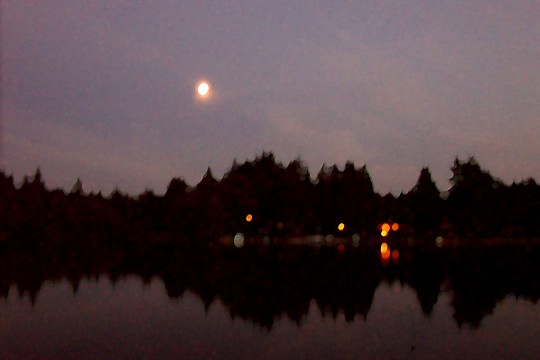
Early moonrise over Lake Ketchum
|
Archive Search |
| Links |
|
and s-integrator |
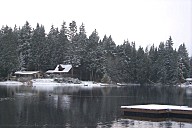
The lake in cooler times
This blog is about living on a lake, right? And why one might want to. Right?
We've had a spring with temperatures never rising to even 70 degrees F. Suddenly, in the course of a day, it is near 90.
I know, I know: in other parts of the country this would be deemed normal. That is, the high 80s and low 90s would be about right for this time of the year.
Well, here, in the Pacific Northwest, that is not the case. And relief is not yet on the horizon.
So, why live on a lake? In the hottest of times, it will not be quite so hot and will cool off at night. By early morning, the inside of our house "dropped" to 70. Some relief, eh?
In the city—Seattle—it may have dropped to 80 last night. So what is ten degrees? It is the difference between being able to sleep at night and not.
Yesterday there was much swimming in the lake. Friends with kids came from everywhere nearby, and some from afar. Of course there was more splashing than true swimming (which means you can't put your feed down, the water is so deep). The lake is in the low sixties still. It offers a cooling respite. Once you get in, you don't want to get out.
On TV last night, news commentators noted a sharp and sudden increase in drownings. Most, but not all, occur in headwaters of rivers—canyons, with boulders and swift currents. Swimmers underestimate the strength of the river, now swollen by snow runoff, and are swept away; their bodies are usually found trapped under a logjam, far downstream.
In lakes there are swimming deaths, too. I remember—back when I didn't have a lake of my own—I was fishing in nearby Lake Sixteen. A man came out to the end of his dock to chat, as I rowed nearby, as owners sometimes do. This is a small, tame lake, one very much like my own now. He told me a boy of about twelve had drowned "right there," pointing to my bow which was about ten feet from the end of his dock.
"Yesterday," he added, for emphasis, though none was needed.
The words chilled me. How easy it is to go under. I am a poor swimmer, yet am frequently wading a river or rowing a boat on my lake. I could easily drown, even though I carry an untested life preserver in my bow. (On rivers you proceed downstream to the nearest bank, which is always less than half the river's width, trying most times to stay on the bar-side of the river, where it is shallowest.)
"You may drown." It is important to keep this dire fact in mind all the while one is on or near water. I don't mean to preach (and shall not). Yet attractive, cooling water such as one finds on a lowland lake poses a real threat. We are long overdue here for a drowning.
The only ones I've ever heard of were not accidental and involved old men who live alone.
- - Comments ()
...
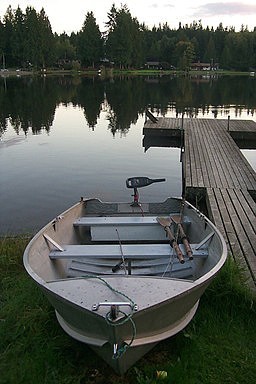
The bluegill guards his nest under my boat
The male bluegill is back on his nest, a little bigger than last year—perhaps an inch longer, which is pretty big for a bluegill. And it is a "he," because it is the male who guards the nest after spawning.
Where she goes is beyond my reasoning. Perhaps back under my dock, where they "live," though what bluegills do, from day to day, can hardly be called "living". But then, what else is it?
The nest is practically under my boat, right up on the shoreline, and the boat offers shade and shelter to the pair, only the pair now is merely "he," because she has disappeared after mating, much in the manner of a human male, but let us drop the pathetic fallacy as analogy because it is the opposite of what I am trying to say.
A hot day, the dogs (my pair from a decuple litter) go in and out of the water. Both black Labs have their eyes on the bluegill, and I warn them, "Leave him alone!" The pay me no heed. In fact, Cate, the female Lab, who is notorious for hunting frogs, and never getting a one, went in after the bluegill, then stood around, looking lost, when he momentarily disappeared down the beach, into the reeds, and the water clouded too much for her pursuit.
Soon it will clear and he will be back guarding the nest, taking up a luxurious position in the shade of my boat, eyes searching the foreground, ready to repel any and all invaders. Except huge ones, like Labs.
Of course I can't use the boat—do not dare—while the nest-guarding goes on. I might disturb the spawn and lose next year's crop.
- - Comments ()
...
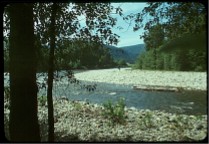
The river near to where I fish
From time to time, this blog will take on a slightly different subject than Life At The Lake. It will briefly become, Life At The River, because I will take on a new orientation.
The summer steelhead fishing season is upon us. It opened slowly on Sunday, and I've been out for a couple hours, each of the past afternoons—before the hot spell hit and the river started to rise sharply from snow melt. Today it promises to be near 90, which is too hot for this boy to continue fishing.
Yesterday, though, I notice something unusual. Well, not so unusual (because it happens every year at about this time), but unusual to me because there are some things that seem to pass by these eyes unnoticed and, thus, unrecorded.
The surface of the water was covered with tiny seeds and pods; some of the pods were large and variegated, looking like over-sized drowned caterpillars. There was a fluffy, downy look to them, and I realized they were the product of some tree, with which I ought to be familiar. Not the alder, surely. The alder had dropped its tassels a month earlier, and I had swept them off the deck, up at the river, where I have property (which not incidentally is for sale).
Now there are only a certain number of species of trees that could produce such litter, such dreck, and it surely was not a conifer, even though the Western red cedar is depositing golden pollen over everything below it, including my windshield.
It is the black cottonwood. Of course! I should have known. And cottonwoods are often being undercut by a raging river and toppling into the river, where the current aligns them parallel with the cutbank. There they remain until another flood sweeps them away and deposits them downstream and elsewhere.
So the river is now littered with soft, fluffy dreck. The copious seeds do the river no real harm, I know. They are simply part of the ongoing phenomena that takes along rivers and lakes.
It is good to note such things and recognize them for what they are, for they enrich a person's life. (I won't say they enrich it "immeasurably," for that is too grand a claim, but it is what I mean.)
- - Comments ()
...

Clematis at my deck
An editorial in this morning's Seattle P-I jokingly sees Blogs as a threat to main-stream media, and its writer "fears" consolidation of blogs and foresees Blogsters as "rivaling major columnists and major political magazine editors." This according to Eugene Volokh—whoever he is.
Another blogster, I suspect, who fears no one, and threatens no one, either.
"Blogs are like a terrier when the media gets a story wrong or the spin is egregious," the editorial goes on.
Well, if so (and I doubt it), what's wrong with that? Network channels, newspapers, magazines, and so-called news consolidations of several media present one, predictable side to what's going on in the world. It annoys them, it does, to be challenged in their supremacy by the likes of some unaffiliated individual with a voice and a blog of his or her own.
They don't really feel threatened, however. They are having editorial fun at the expense of the likes of us. We generate no money and dominate no industry. We are small by definition, and come close to that classic idea of a single voice howling in the wilderness.
The editorial goes on to say that the readers of blogs tend to read stuff "they already agree with—and that is not enough."
This is not the case, and the writer (well-paid by a Hearst-organization newspaper) can be justly accused of creating another straw man to be knocked over, so the idea of intelligent individual expression that is not institutionalized can be dismissed. It is not so easy.
The blog is democracy being practiced in its most precious sense. It is not the loudest voice that is being heard, due to the consolidated power of the media and its vast monetary resources; it is a single voice, speaking softly, of some intelligent human being who has something to say and nothing to gain personally or monetarily.
It is being done in the fine, long tradition of journal keepers, who write because they cannot stand happenings passing on by without notice or comment.
- - Comments ()
...
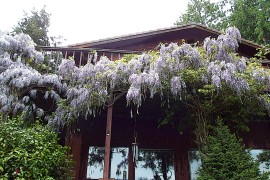
Duck, here it comes again!
The wisteria—a month ago nothing but brown canes—is not only blooming, it is taking over. It is a big nuisance. I cut it back at dinner time, including some of the still-blooming stalks, because it is claiming the porch, and along with the porch our outdoor existence.
Maybe it is a joke, the way it seemingly spreads, even as you look at it, but it is decidedly a terror. And it grows up between the boards in the deck and snakes across the walking area, threatening egress. Somebody could well do a horror film on the "Wisteria from Outer Space." (But I wouldn't go to see it.)
Now, here comes the honeysuckle. It is nearly as pernicious. It has an interesting history, ours does. It originally came from my wife's mother's front yard. It was transplanted from her garden in Lynnwood to ours in Seattle. Then my wife took some rooted cuttings up to our place on the river. It grew there modestly, just managing to stay alive.
When we came to the lake, naturally my wife took some rooted cuttings to the side yard, where she stuck it into the gravel walkway, right next to the wisteria that already grew there abundantly.
It hung on for the next several years, staying alive but doing not much of anything. This year it not only has come into its own; it is in open-space competition with the wisteria, and well may win out.
The honey suckle is going everywhere. Never have I seen a plant look so . . . healthy. Its vines are dark purple, thick, luxurious, its leaves rich and wide. As though it has a mind—a plan for establishing dominion—it is heading for one of the pillars that supports the small roof over part of the porch.
"Don't cut it back," my wife calls out to me, as I whack away at the wisteria at dinnertime. And she tells me its long history.
So I cut only wisteria. Truth is, I don't want to cut back the honey suckle either, for it will soon blossom, and the wisteria will be bloomed out for the year.
But when it reaches Pillar Number One, it will move on to Pillar Number Two, I know, and then all human movement across the porch, the deck, will be halted in a tangle of vines. The flowers will be beautiful and fragrant as at a southern mansion.
No doubt about it, it will survive. The question is, will we survive it?
- - Comments ()
...

In June the visiting boats begin to drop off a little
Out in the center of the lake shortly before dark a number of soft rings started appearing. My former next door neighbor, pointed at them and said, mockingly, slightly contemptuously, "Look, the trout are rising. And you guys"—her husband was fishing from his dock, as was I—"aren't catching any."
"Look again," I said, with my own degree of contempt. And then I added "They aren't rising."
She looked again, then silently went inside her house to attend to her baby daughter.
I wondered if she really did, "look again," for the swallows were touching the lake as they captured various bugs during the hatch that usually takes place just before dark.
The rings they made looked much like "smutting" trout, but not if you looked closely, or "looked again," as is contained in the root of the word, "research," from the Old French "cerchier," and with the prefix, "re-" to look "closely," which I have always erroneously, it would seem, interpreted to mean "again." But "closely" will do.
It is the usual evening dance the barn and tree swallows perform over the lake, usually out at the center. Only a few trout "ringed" and that was closer in, within casting distance. But John, her husband, and I hooked not a one.
It has been better lately, but with anything but the artificial fly. It has been downright good, in fact.
- - Comments ()
...
BLOGS--Phony?
Are all blogs as phony as this one? I suspect so.
A blog by definition is personal, but it is not autobiography, or else had not better be, or it will soon fall apart, dissolve into self-love and deceit.
My blog is not representative of my life, and you may thank me for it. It is entertainment! As writer Richard Ford said to an interviewer, who was determined to prove the point that a writer—in this instance, Raymond Carver—wrote out of his "life." That is, he lived his life and wrote wonderful short stories based on his experiences.
Ford said, in effect, bull shit. A short story is a creative effort; it may have surface resemblance to episodes in the writer's life, but to interpret the story as fact, or as life, is a huge mistake, and it will almost always mislead you. You will reach a conclusion that is—to use my favorite word for the day—phony.
Thus, my life, and how I lead it has no direct correspondence to my blog—how I feel, how I use (up) my time, what I watch on TV (and I do), what goes on around me (though often this suggests the material for a blog entry, I'll admit). And let me tell you in part why:
A man I know only slightly, who lives on the lake, new here, just lost a daughter. She died during, or quickly after, what he calls a "routine" operation. In London. She was 40 years old. He describes his sense of loss in an email to a number of friends; my wife's name happens to be on his long list.
He describes his writing to us "with the heaviest heart I think I can stand." He will fly tomorrow to England to "attend to all the thing we never imagined he would ever have to do for our daughter."
So I put it into my blog. Why? Well, for one thing, it contains some of the most poignant and precise language I have read in a long, long time, and I have read a lot of good stuff lately, and over the years. And, notice, he remains anonymous in this blog and in his grief.
The heart, when it has terrible need to speak, delivers its message in terms so genuine and precise that it makes ordinary daily discourse seem—what is that word for today, relating to blogs?
Phony, I called it. I could just as well described blogs in general as creative writing for the untalented.
- - Comments ()
...